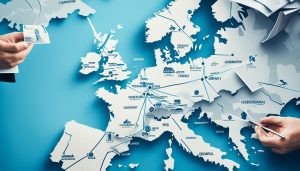Are you expanding your business to Europe? Here are ten tips for navigating the European market successfully.

Starting a European company offers automatic access to one of the world’s foremost business centers, featuring a highly developed infrastructure, robust legal system, and a proficient workforce. The European Union (EU) is the third-largest economy globally, with a substantial nominal GDP of $15.8 trillion, making it the largest trading bloc. Consequently, Europe continues to be an extremely appealing destination for international investment and establishing businesses.
However, venturing into international business outside your home country can be challenging, primarily due to potential pitfalls related to unfamiliarity with local business customs, cultural differences, and legal requirements. To navigate this successfully, here are eight valuable tips to consider when conducting business in Europe.
Eight Incredible Tips for Doing Business in Europe
Keep reading to learn insider tips for doing business in Europe and setting up your business for success.
Europe And the European Union Are Not The Same
When conducting business in Europe, it’s crucial to understand that Europe and the European Union (EU) are not synonymous terms. The European Union is a political and economic union of 27 countries that have chosen to integrate their policies and economies in various ways. Its formation aimed to promote peace, stability, and economic cooperation among member states. Fundamental principles of the EU include the free movement of goods, services, capital, and people within its borders, as well as a common currency, the Euro, shared by 19 of its member nations.
It’s essential to recognize that not all European countries are members of the EU. Europe comprises diverse nations, each with its unique business environment, regulatory framework, and economic conditions. While some countries are EU members, such as Germany, France, and Italy, others, like Norway, Switzerland, and the United Kingdom, have opted to maintain their independence and are not part of the EU.
When expanding or trading in Europe, businesses must consider the specific regulations and trade agreements that apply to individual countries. For instance, a product compliant with EU regulations may not meet non-EU European countries’ standards. Additionally, understanding each nation’s currency and legal requirements is crucial for successful cross-border transactions.
Many non-EU European countries aspire to join the European Union due to the perceived economic benefits, political stability, and access to a larger market. Therefore, keeping abreast of EU enlargement processes and potential changes in membership is vital for businesses seeking to establish a presence or expand operations in Europe.
Focus On One Or Two Countries At A Time
When considering business expansion in Europe, we recommend initially targeting one or two specific countries. The key is to introduce your products with minimal investment swiftly. European small and medium-sized businesses should maintain a focused approach to accomplish this.
Given the diverse nature of the European market, newcomers must familiarize themselves with the local conditions of the chosen country. Concentrating on your primary objectives is the most efficient way to proceed. This approach accelerates learning and minimizes expenses.
Before venturing into a foreign market to expand your business, thorough research is imperative. This is especially vital for small and medium-sized enterprises with limited resources, as mistakes during the expansion phase can be costly.
Not Everyone In Europe Speaks English
In Europe, English is widely spoken and often considered a lingua franca for international communication. However, it’s essential to remember that only some in Europe speak English fluently. Each European country has its primary language or languages, and these linguistic differences can significantly impact businesses operating in the region.
For instance, Spanish (Castilian) is the predominant language in Spain, while Catalan, Galician, and Basque are also spoken in certain regions. French is the official language in France, but some communities still speak regional languages like Breton, Occitan, and Alsatian. Moreover, in countries like Greece, Greece, and Hungary, the national languages are Greek and Hungarian.
When companies primarily use English in their communication, they may alienate potential customers who are more comfortable with their native language. For example, a Spanish consumer may feel more inclined to engage with a business that provides Spanish rather than English information.
According to Harvard Business Review, nine out of ten Internet users said that they always visited a website in their own language when given a choice of languages. Nearly one in five Europeans (19%) said they never browse in a language other than their own. 42% said they never purchase products and services in other languages.
To be successful in a diverse European market, businesses should offer products and services in the local language, provide customer support in the native tongue, and tailor marketing materials to resonate with regional cultural nuances.
Know That Every European Country Has Different Tax Rates
In Europe, every country has its distinct corporate tax rates and regulatory requirements, presenting multiple challenges and opportunities for businesses operating across the continent.
For instance, take the Netherlands, often recognized for its favorable tax climate. The country offers an attractive corporate tax rate of 25.8%, depending on profit levels, and encourages international businesses with its extensive network of double taxation treaties. Contrast this with Germany, where the corporate tax rate is approximately 29.8% and compliance requirements are relatively stringent. Businesses venturing into these countries must adapt their financial strategies accordingly.
In Ireland, the corporate tax rate stands at a low of 12.5%, which has attracted numerous tech giants to establish their European headquarters there. However, nearby France maintains a higher tax rate of around 25%, coupled with complex labor laws. Thus, businesses must navigate these varying tax landscapes to maximize their financial efficiency.
Moreover, regulations surrounding employee benefits, labor laws, and social security contributions differ substantially from one European country to another. While Scandinavian nations emphasize robust welfare systems, Eastern European countries may offer lower labor costs but require businesses to navigate more bureaucratic procedures.
There Are Different Currencies in Europe
Europe is a continent known for its rich cultural diversity, which extends to its currencies. While the Euro (EUR) is the common currency of 20 of the 27 European Union (EU) member countries, not all European nations have adopted it. Several countries have chosen to maintain their unique currencies, which businesses operating in Europe should remember.
For instance, the United Kingdom (UK) uses the British Pound (GBP), which is not part of the Eurozone. Switzerland, another European nation, relies on the Swiss Franc (CHF). Meanwhile, countries like Denmark, Sweden, and Norway have their respective currencies (Danish Krone, Swedish Krona, and Norwegian Krone).
Businesses operating across these regions must account for these currency differences in their financial planning, pricing strategies, and transactions. Exchange rates fluctuate, impacting costs, revenues, and profit margins. Moreover, customers’ preferences and purchasing power vary with different currencies, necessitating tailored marketing and sales approaches.
Keep A Formal Approach
When conducting business in Europe, it’s essential to adhere to formal etiquette, including greetings like handshakes and, in some countries, even kisses. Typically, men exchange firm handshakes, while a gentler handshake is more appropriate for women. However, in Italy and France, it’s customary for men to kiss female business associates on the cheek, but only if they share a familiarity; otherwise, a handshake suffices.
It’s advisable to research the specific customs and manners of the countries you’ll be visiting. When uncertain, it’s best to approach your behavior as if you were attending a formal wedding with people you aren’t well-acquainted with.
In terms of attire, opt for an elegant and understated look that blends in with the European style. Avoid flashy clothing and accessories, as Europeans prefer subtlety and classic fashion. Prioritize dark or neutral colors and choose high-quality leather shoes, bags, and watches. Keep your accessories minimal, and refrain from wearing overly extravagant items. Save flashy attire for leisure activities back home.
Know Public Holidays
European countries have diverse cultures and traditions, reflected in their unique public holidays. For businesses operating across Europe, understanding and respecting these holidays is crucial for successful operations and maintaining positive relationships with local communities.
For instance, Oktoberfest is a significant celebration in Germany, and businesses in Bavaria may experience a drop in productivity as people take time off to participate in the festivities. In Spain, the siesta culture still prevails in some regions, with businesses often closing for a few hours in the afternoon.
In the Netherlands, King’s Day is a nationwide celebration, and businesses should be prepared for closures and heightened demand for orange-themed products and services. In France, Bastille Day on July 14th is a national holiday with parades and fireworks, causing many businesses to close.
Use Digital Platforms
In today’s digital age, businesses across Europe are leveraging the power of online marketplaces like Amazon and eBay to tap into the growing e-commerce trend. With many Europeans now preferring to shop online, these platforms offer a vast and ready customer base.
Amazon, for instance, boasts a substantial presence in Europe, with numerous localized websites catering to different countries, such as Amazon.de for Germany or Amazon.fr for France. This allows businesses to reach customers across borders without extensive market research or expensive advertising campaigns. Moreover, Amazon’s Fulfilled by Amazon (FBA) service handles storage, packing, and shipping, making it a convenient choice for businesses looking to expand their reach.
On the other hand, eBay provides a unique platform for new and established businesses. With its auction-style listings and fixed-price options, eBay allows companies to experiment with pricing strategies and gauge customer interest. Additionally, eBay’s global reach means businesses can access buyers from various European countries.
However, it’s important to note some challenges in this approach. Managing inventory across multiple channels can be complex, require manual intervention, labor-intensive, and susceptible to human errors. Neither platform offers an automated solution for order fulfillment integrated with your inventory control system.
Related posts:
 Advantages and Disadvantages of Doing Business in Europe
Advantages and Disadvantages of Doing Business in Europe  What is Needed to Start a Business in Europe
What is Needed to Start a Business in Europe  Things Americans Need To Know Before Starting a Business In Europe
Things Americans Need To Know Before Starting a Business In Europe  How To Market Your Business In Europe?
How To Market Your Business In Europe?  Starting Your Beauty Business in the UK and Europe
Starting Your Beauty Business in the UK and Europe  Steps of Starting a Business
Steps of Starting a Business  EMI Banking Solutions in Europe
EMI Banking Solutions in Europe  Business Consulting Services in Europe
Business Consulting Services in Europe  Doing Business in Europe in 2025
Doing Business in Europe in 2025  How to Start a Successful Business in Europe
How to Start a Successful Business in Europe







